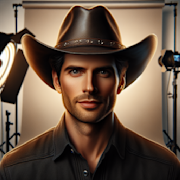Silent Film Icons: The Pioneers of Classic Hollywood

Silent films hold a special place in the history of cinema, where stories were told through masterful visuals and expressive gestures, without the aid of sound. These timeless classics laid the foundation for the glitz and glamour of the modern-day Hollywood we all know and love. In this blog post, we delve into the lives and legacies of the silent film icons who brought the magic of cinema to life, crafting a rich tapestry that would forever shape the industry.
1. The Birth of Silent Cinema
Introduction to Silent Films
Silent films emerged in the late 19th century as an exciting new form of entertainment, capturing the imagination of audiences worldwide. These early films relied solely on the power of visuals to convey stories, with poignant and often exaggerated gestures becoming the language of the silver screen.
The Lumière Brothers: The Pioneers
The Lumière Brothers, Louis and Auguste, are widely regarded as the pioneers of silent film. Their 50-second masterpiece, “L’Arrivée d’un train en gare de La Ciotat” (The Arrival of a Train at La Ciotat Station) in 1895, stunned audiences with its simple yet awe-inspiring depiction of reality. Their invention, the cinematograph, revolutionized the film industry, providing a platform for other visionaries to flourish.
2. The Silent Film Icons
Charlie Chaplin: The Tramp’s Enduring Legacy
One cannot discuss silent film icons without mentioning the legendary Sir Charles Spencer Chaplin. Known for his iconic character, “The Tramp,” Chaplin’s expressive performances and comedic timing brought laughter and warmth to audiences worldwide. The combination of his unforgettable on-screen persona and his exceptional directorial skills elevated him to unparalleled heights in the silent film era.
Greta Garbo: The Enigmatic Star
Greta Garbo, the enigmatic Swedish actress, captivated audiences with her beauty and aura of mystery. Her emotive performances and striking screen presence made her one of the most iconic leading ladies of the silent film era. Garbo’s transition to “talkies” was met with great success, proving her versatile talent and securing her place in film history.
Rudolph Valentino: The Heartthrob of the Silver Screen
Rudolph Valentino, the heartthrob of the silent era, left a lasting impact on audiences with his charm and magnetic appeal. Known as the “Latin Lover,” Valentino’s roles in films like “The Sheik” (1921) and “Blood and Sand” (1922) earned him a dedicated following of swooning fans. His untimely death at the age of 31 shocked the world and marked the end of an era in silent film.
3. The Legacy of Silent Films
Advancements in Cinematic Techniques
While silent films lacked the technological advancements we enjoy today, filmmakers of that time employed innovative techniques to create powerful storytelling. From the innovative use of close-ups to the mastery of on-screen chemistry, these early filmmakers laid the groundwork for the techniques used in modern cinema.
Preserving Silent Films: A Treasure Trove of Film History
Silent films form an essential part of our cultural heritage, telling stories from a bygone era. Unfortunately, many of these films have been lost due to neglect and deterioration. However, dedicated organizations and film enthusiasts work tirelessly to preserve and restore these cinematic treasures, ensuring they remain accessible for future generations.
4. Silent Films: An Inspirational Influence
Influence on Modern Filmmakers
The influence of silent films can still be felt in modern cinema. Filmmakers like Martin Scorsese, Quentin Tarantino, and even contemporary directors such as Christopher Nolan acknowledge the impact of the silent film era on their craft. From storytelling devices to visual aesthetics, the spirit of silent film resonates throughout the film industry.
The Resurgence of Silent Films
While sound revolutionized the industry, there has been a recent resurgence of interest in silent films. Festivals and events around the world celebrate the magic of silent cinema, reintroducing these classics to new audiences. This resurgence serves as a testament to the enduring power and timelessness of silent films.
5. The Silent Era: A Golden Age of Cinema
A Reflection on Classic Hollywood
The silent film era paved the way for the glitz and glamour of Classic Hollywood that we still celebrate today. It was a time of innovation, creativity, and capturing the essence of storytelling through the sheer power of visuals. From the birth of cinema with the Lumière Brothers to the charismatic performances of Charlie Chaplin and the allure of Greta Garbo and Rudolph Valentino, these silent film icons immortalized themselves and their art, forever shaping the landscape of Hollywood.
In conclusion, the pioneers of silent cinema left an indelible mark on the film industry. Through their creativity, innovation, and sheer talent, they transformed silent films into an art form, captivating audiences worldwide. Their legacy continues to inspire modern filmmakers and reminds us of the timeless allure of the silent film era. So, take a step back in time and immerse yourself in the magical world of silent cinema, where the power of visual storytelling reigns supreme.

Alberto Miller
Movie Fanatic
More From Classics Authority Movies

Movie
Bringing Up Baby (1938)

Movie
The Kid (1921)

Movie
White Heat (1949)

Movie
A Separation (2011)

Movie
The Cabinet of Dr. Caligari (1920)

Movie
Casablanca and Beyond: The Timeless Appeal of Classic Romance Films





